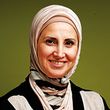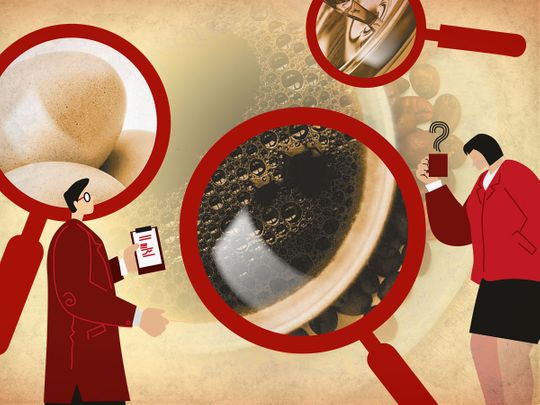
Dubai: In this age of TMI (Too Much Information), how should we keep ourselves dry from the unstoppable deluge of health studies, which — more often than not — end up contradicting each other’s findings?
Take coffee for example. Alternately, its villified (promotes heart attacks, high blood pressure and anxiety) and valourised. Just last month, a study by Queen Mary University of London (QMUL), part-funded by the British Heart Foundation (BHF), concluded that even 25 cups of coffee a day may not be harmful to health.
Pick any food randomly from your kitchen pantry and chances are it is sitting in the middle of a studies-led tug-of-war. What’s the consumer to do?
“We need to understand that we are evolving everyday. Some health guidelines of the last decade can be overturned by studies today mainly because of the drastic change in our food preferences and lifestyle,” says Juliot Vinolia, clinical dietician, Medeor24/7 Hospital, Dubai.

Any information published through private sites should be prior reviewed by a committee of experienced medical specialists.
Dr Zainab Suri, specialist internal medicine, Medcare Hospital, Sharjah, says: “There are important food items that are consumed by people of different ethnic origins and these include coffee, soy, chocolate, clarified butter, wheat, coconut oil, salt, milk, egg, and sugar. As science has advanced, facts about certain food items have changed due to more investigations.”
There are important food items that are consumed by people of different ethnic origins and these include coffee, soy, chocolate, clarified butter, wheat, coconut oil, salt, milk, egg, and sugar. As science has advanced, facts about certain food items have changed due to more investigations.
In fact, today’s contradicting studies complement each other by offering more clarity on the findings for the scientific community, according to Vinolia.
For example, it was known that dark chocolate is an antioxidant and boosts mood too, she says.
“This fact existed earlier but was not given much consideration; now with the advances in science and the important of antioxidants in health and disease prevention and protection, scientists have restudied them to prove these benefits, as well it has a protective effect against CVD.”
Dr Suri cites another example: “In 1917, the journals on diabetes advised against consuming any sugar or carbs. However, today, the latest researches and international foundations of disease management such as American Diabetes Association, British National Health Service, US National Institute of Health, found that healthy meal plans should contain carbs, but complex carbs.”
In 1917, the journals on diabetes advised against consuming any sugar or carbs. However, today, the latest researches and international foundations of disease management such as American Diabetes Association, British National Health Service, US National Institute of Health, found that healthy meal plans should contain carbs, but complex carbs.
The thing to understand, says Vinolia, is these studies are not to be interpreted by the individual. “It would be highly [misleading for] the common man [if they began to] simply compare the conclusion of studies based on particular foods without understanding the differences of sample population or research method.”
Health studies are meant for scientific communities offering them scope for future research and improve current health practices, she says.
So what should the hapless public do? “Follow governmental health guidelines or govt-recognised websites for medical education and research. Any information published through private sites should have been prior reviewed by a committee of experienced medical specialists or individuals with govt health department affiliations or licensure,” advises Vinolia.
Another important point: A food that is healthy for one individual might not suit another. Genetics, age, pre-existing disease conditions, stress, food processing, are all factors which affect an individual’s relationship with food and health. “Research conclusions should only be seen as contribution of knowledge to the existing pool of scientific information; not for consumers to carry along to the grocery store.”
Good egg vs bad egg
Let’s take a look at the chequered fate of eggs, for example, which have been a top favourite of review studies.
1996: Study published in the Annals of Nutrition and Metabolism, concluded that 2 eggs per day for 3 weeks increased both total cholesterol and LDL (bad) cholesterol which are indictors for progress of heart stroke. This risk factor can accelerate fat clogging in the blood vessels among populations of high cholesterol intake.
2006: Study published in Current Opinion in Clinical Nutrition and Metabolic Care found that egg intake indeed increased LDL cholesterol but it was a different version of LDL, one which does not clog or stick to blood vessels. Hence dietary guidelines on restricting egg consumption should not be generalised to healthy populations.
2016: Study published in Journal of American College of Nutrition. A meta analysis study of egg consumption and risk of coronary heart disease and stroke. It found that intake of 1 egg per day increased HDL good cholesterol and reduced the risk of stroke and there was no clear evidence that eggs increased or decreased heart blocks.
2018: Study published in Journal of Brazilian Society of Cardiology. An observational study of a sample of over 4,000 people showed that if an individual has good eating habits as a whole, the intake of whole eggs with considerable weekly frequency seems to be safe. Above all, the prescription of eggs in clinical practice is a very individual factor, mainly depending on lipid and protein adjustments. Taken together, dietary cholesterol mainly by using the egg as a source can alter the lipid profile by increasing the markers in general.
2019: Study published in Journal of American Medical Association. Concluded that once the daily dietary cholesterol intake was fixed and the frequency of eggs or amount of eggs taken within this dietary cholesterol limit did not show any increase on cardiovascular risk factor. (Hence monitoring the overall dietary cholesterol intake per day either from egg or any food source was more significant in preventing heart disease.)
Contradictory conclusions? Yes. But they are also complementary in offering more clarity on the effect of eggs on heart disease, says Vinolia.
What should the consumer conclude?
- Egg does increase blood cholesterol levels, the non-harmful LDL and improves HDL function of clearing fat spots in blood.
- Choline, a nutrient in egg, has also shown to prevent fatty liver and this overall effect prevents our body from producing its own cholesterol.
- Egg is a whole food and reducing egg intake or elimination of the yolk from the diet completely does not effect health.
Having eggs on a reasonable amount of one per day or 4 per week is evidently known to not affect health negatively.
Caveat: According to the American Heart Association, chronic diabetic patients with a genetic risk of coronary heart disease and high blood cholesterol should be mindful of their overall dietary fat intake, focusing more on eliminating transfats and processed fats in their diet.
Egg is a whole food and reducing egg intake or elimination of the yolk from the diet completely does not affect health. One egg per day or 4 per week is evidently known to not affect health negatively.
Statutory advice
Juliot Vinolia’s to-do list for people who blindly follow study findings:
- Any clarifications on [altering] health practices whether on diet or lifestyle should be clarified with registere/licensed medical professionals who can assess and guide you.
- Follow online, several health forums both governmental and govt recognised medical organisations which offer health education on popular health myths. Turning on notifications from such sites can keep those interested updated.
- Isolated opinions on health matters with no scientific evidence should not be directly applied to our lifestyle.
- Consumers interested in future research can look for the following in studies: long-term studies of a large sample size over 1,000 participants, conducted for a long period at least over 3-6 months or many years. These give a more reliable conclusion, preferably human studies.
- Looking at multiple long-term human trials provides more reliable pointers on applying those findings in our daily life.
Someone help me make up my mind!
Here’s a look at some of the contradictory studies on some top foods
Coffee

BAD: 5 to 6 six cups of coffee per day to weight gain and metabolic syndrome (2013) study by the Western Australian Institute for Medical Research (WAIMR) and the University of Western Australia’s School of Medicine and Pharmacology).
In August 2013, the results of two studies on coffee (one by Mayo Clinic Proceedings, the other by Duke-NUS Graduate Medical School) came out around the same time - and while Mayo equated coffee consumption with premature death, the other described it as a way to live longer.
GOOD: 25 cups of coffee a day is good for you: Queen Mary University of London (QMUL) study. The research was part-funded by the British Heart Foundation (BHF).
1 to 3 cups of coffee per day were 29 per cent less likely to develop liver cancer. Those who consumed at least four cups per day were 42 per cent less likely to develop liver cancer.
Olive oil

GOOD: Those who ate a diet high in extra-virgin olive oil were 30 per cent less likely to suffer a heart attack or stroke. (Researchers in Spain who spent five years studying the effects of olive oil. Their findings were published in the New England Journal of Medicine in 2013).
BAD: Olive oil reduced blood flow to the arteries by 31 per cent after consumption (thus promoting heart disease). Research by Dr Robert Vogel of the University of Maryland School of Medicine published in Journal of the American College of Cardiology in 2011.
Soy
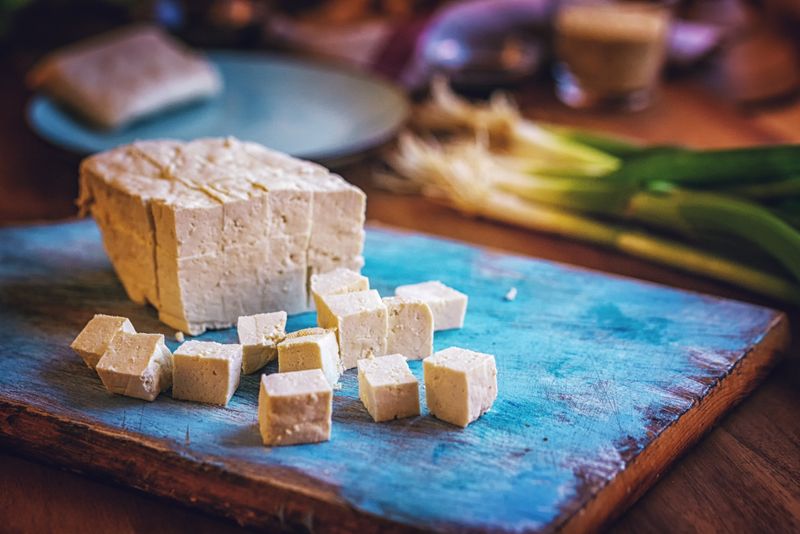
BAD: Eating most tofu during midlife had up to 2.4 times the risk of later developing Alzheimer’s disease. Men who consumed tofu at least twice weekly had more cognitive impairment, compared with those who rarely or never ate the soybean curd. (Study involving elderly Japanese-American men by the Hawaii Centre for Health Research.)
Eating high amounts of soya may adversely affect thyroid function. (Study by Loma Linda University in California).
GOOD: The positives of soy, in studies too numerous to quote, are that it is supposed to combat many things: from prostate and colon cancers, high LDL cholesterol, menopausal symtoms to osteoporosis.
Tea
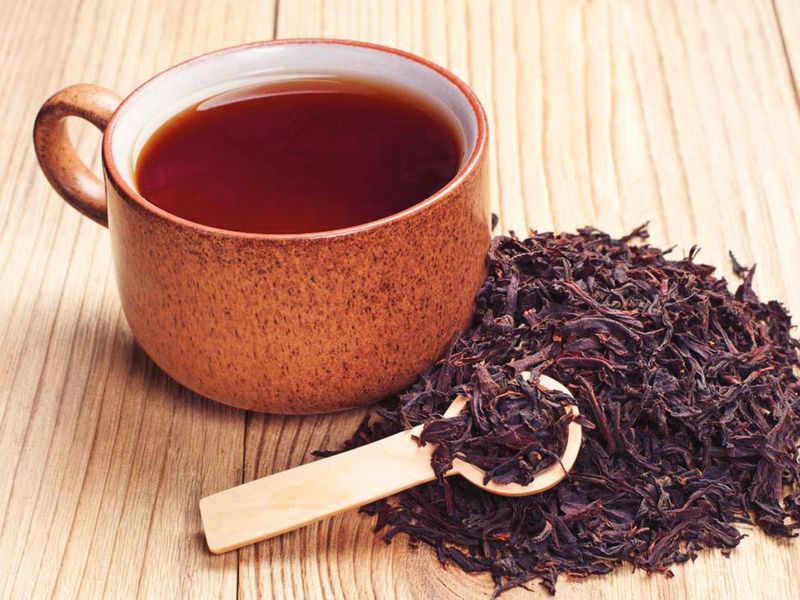
GOOD: Drinking a cup or more of Black Tea daily had a 44 per cent reduction in risk of heart attack compared to non-tea drinkers (Harvard study on heart patients, men and women).
Drinking one to two cups of Black Tea daily had a 46 per cent lower risk of atherosclerosis, an indicator of cardiovascular disease. Those who drank more than four cups of tea a day had a 69 per cent lower risk. (Dutch study)
Tea is said to help in plenty ofways: reduces cholesterol, provides antioxidants, protects against heart disease, cancers.
BAD: Heavy tea consumption linked with esophageal cancer, according to a study published in the British Medicine Journal.
Toxic cuppa: 30 common off-the-shelf varieties of black, green, white, and oolong tea bags when steeped for 3-4 minutes and for 15-17 minutes showed 73% of lead and 83% of lead respectively. (Study in the Journal of Toxicology in 2013.)
Conclusion? Toxic contamination by heavy metals was found in most of the teas sampled.
Red meat

BAD: Combined intake of red and processed meat associated with all-cause mortality and cardio-vascular mortality (study by Loma Linda School of Public Health, California, on non-meat eating populations).
There have been scores of studies on increased levels of inflammatory and oxidative stress, and Type 2 diabetes and CVD due to high red meat consumption.
GOOD: Higher red meat consumption has a link with better neurological functioning! (Study in the European Journal of Epidemiology).
No link found between moderate meat consumption (up to three ounces a day) and premature death (Japanese study of more than 51,000 men and women for 16 years).
The Harvard School of Public Health also found no connection between eating unprocessed red meat and heart disease and diabetes, though there was a strong connection with eating processed red meat.
Plenty of studies say the link between red meat and heart disease is inconclusive.
No single study should grab headlines, experts say
Dr Zaineb Sabri, specialist internal medicine, Medcare Hospital, Sharjah
“To accept any new fact, it should be well-studied and the study done on a good number of populations with good outcome and results. When we prescribe a certain food or ask our patient to avoid a food, we as physicians look into facts and how strong the study was and how it relates to other studies in the field that had given the same outcome. In addition, we take into consideration the number of years that the study took to be completed.”
Dr Murli Krishna Neelkantan, specialist interventional cardiologist, Prime Hospital, Dubai
“I think all studies on food groups need to be taken with a pinch of salt. As doctors, we know that only scientific studies done in control groups are standardised. The outcome of these studies are reported in reputed international medical journals. Studies are subjective as they are based on people. In the coffee experiment (see right), we would have people drinking coffee in different concentrations, different blends, their age groups might differ and there could be many more variables. “I usually tell my patients not to get too confused about foods. The key to food consumption is moderation. If a patient comes to me and asks me about virgin coconut oil, I encourage him to have a teaspoon each day. It is likely that those who may be food fried in coconut oil more than two to three times a week, will be disadvantaged, but a person having a teaspoon a day is not likely to be harmed. On the contrary, they might be able to derive its benefits. The same goes for soy, chocolate, egg, milk or meat. Food groups are not good or bad per se. It is how we consume them, in what quantities and proportions.”
Dr Brajesh Mittal, deputy medical director and consultant interventional cardiologist, Medcare Hospital, Dubai
“The findings of any one study should not make headIines. Studies are a part of ongoing research ... meant to provide knowledge to relevant professionals and regulating societies. Results depend on many factors: nature of trial, size and quality of subjects, inclusion and exclusion criteria, primary objectives v/s secondary observations, etc. For the average person, there is no need to interpret the research and jump to conclusions. Though the commercial bias remains a concern, all the standard research is well regulated by the appropriate agencies. [It] involves multiple centres and multiple researchers; completely blinded even to the researchers many times as the third party does evaluation and interpretation. We have seen many studies results completely contradict the interest of the funding company.
“As a cardiologist, I keep reading new science but do not change my practice even if there is a deviation in the new study. I use all the resources, the arguments in favour and against the findings, rebuttals and commentaries from the world experts before deriving a conclusion. We base our practice on the latest guidelines from the national/ international societies who keep revising the guidelines according to the new available research. Even though we believe in a new emerging concept; we still wait for the final word from the regulatory bodies before putting them into practice.”
Advice
- Do not change your practices based on media reporting, or on the circulated results of the research by yourself.
- Follow the authentic ‘patient/ public resources’ for any information on the related subject.
- Discuss with and take advice from the relevant healthcare professional.
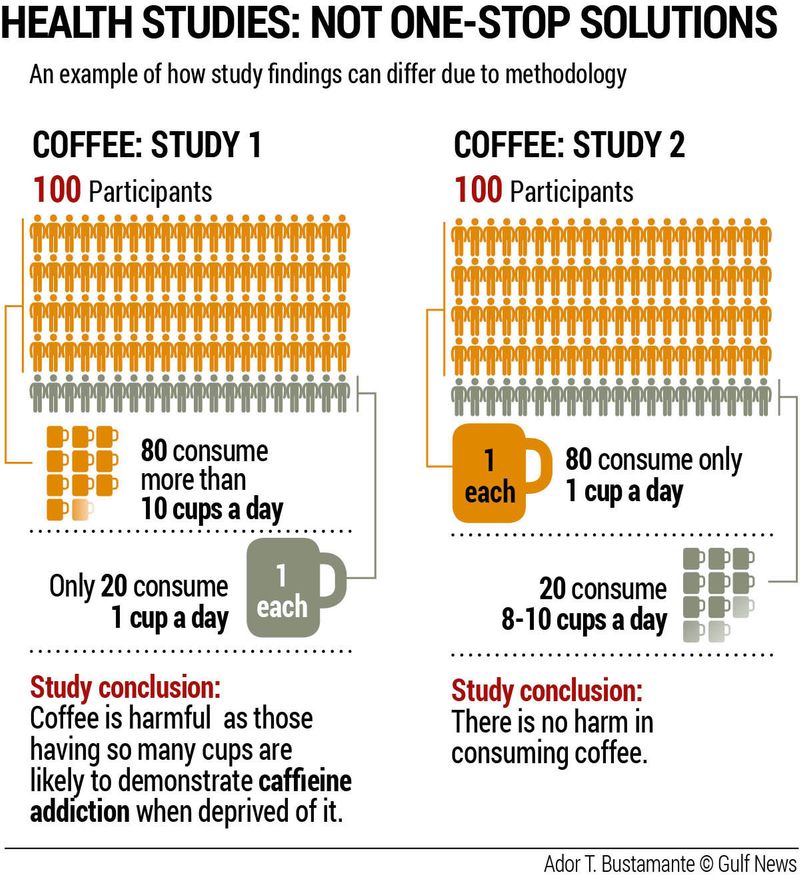
Residents reserve their right to be wary of deluge of health studies
Blessy Martin, Indian, 40
“I won’t blindly follow the conclusions of a health study. I decided to follow the Keto diet when I read about it, but not before I went and spoke with a doctor. I implemented it and it worked for me. Authenticity of studies is what matters the most. If the study is from a trustworthy institution, I may consider what they’re saying. There also has to be a good reason why they decided to undertake a study, to identify a real health issue.”
Tesnim Hatab, American-Lebanese, 21
“I study public health so I’m always reading about health studies. Is the source credible? If yes, I read [it] further. I don’t follow all of the recommendations unless it’s about something extremely important or severe. To be honest it’s difficult to keep up with studies because some of them are so extreme, there’s so much information and so many studies. Some of these studies even contradict one another, so even if you wanted to follow their recommendations, which would one would you choose?”
Basma Abu El Azm, Egypt, 32
“I follow the Keto diet; it has been the best thing I’ve done, I’ve lost a lot of weight and I feel great - and this is despite reading so many articles about how bad it supposedly is. There are so many studies out there and many contradict each other, so the best thing is to do your research and try what suits you, and if you see positive results, then stick with it. Sometimes I might try what a health study says just to see if it’s credible, but gradually I return to my habits unless it negatively impacts my health.”
Maya El Debeiki, 31, French-Egyptian, online fitness coach
“A lot of research is biased. You can’t believe everything you read. So I look for credible sources and credible websites, especially FDA-approved websites. I don’t always check with my doctor but I do check with personal trainer, nutrition coaches. At the end of the day, I believe in a well-balanced eating plan. For example, eggs were labelled as bad for the longest time but recently it’s been proven that the yolk of eggs does not cause bad cholesterol. Everything in moderation makes sense.”
Cindy Bern Jagmis, 32, Filipino, assistant teacher
“I had a serious health condition earlier this year so I tried to read up on all the health studies. But [some] studies contradict each other and I get confused. The latest I read was about coffee and that it is good for us. I feel some of the studies may have skewed results based on whoever commissioned the study or what products they are selling. So whenever I have a health concern, I do my due diligence and research on it but make sure to check my sources.”
Fadi Shamsi, 37, Syrian, business development manager
“Most studies pushed on to the public are financed by major corporations as part of their marketing campaigns. We must go by common sense in assessing the credibility of such studies. For example, coffee is full of anti-oxidants and boosts metabolism while eggs are high in quality proteins. But both when consumed in high amounts make them unhealthy. I personally believe getting complete blood work done every six months is necessary.”
— Compiled by Sami Zaatari, Staff Reporter


